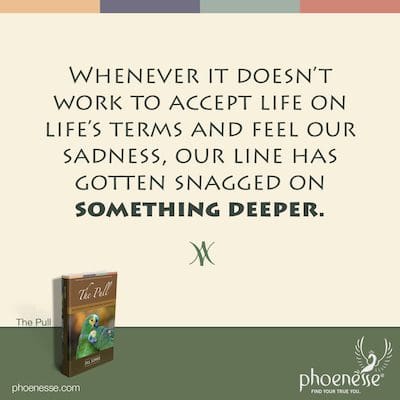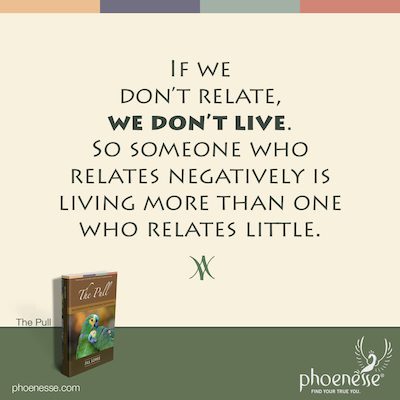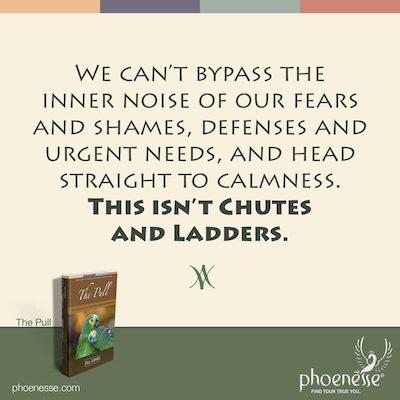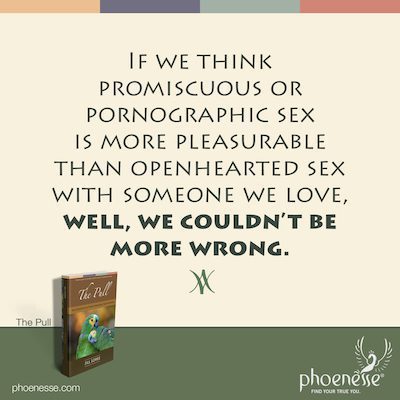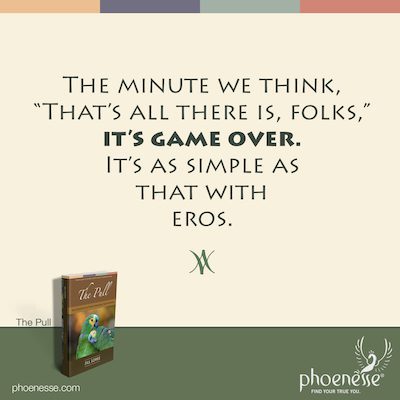Show Notes
It’s a breeze to focus on outer actions; it’s a bear to face everything within. Evasion is a wily coyote. But let’s repeat: if we’re feeling stagnation, discouragement or depression because we’ve come to believe self-knowledge isn’t worth bupkis, we’re skimming over something important in some corner of ourselves. In relation to this, there are two decidedly different emotions, sadness versus depression, that will be helpful to sort out because of the way they affect our ability to relate to others.
In the most clear-cut cases, the two look nothing alike. We probably know this from our own individual past experiences with each. But sometimes they drop in at the same time, intermingling and overlapping. Sadness can make us believe there is no depression present. Or we might believe that our feelings of sadness and pain are purely norma. But we overlook destructive elements lurking nearby. What we need to do is tease out any unproductive depression—and why it’s here—in spite of the presence of reasonable and rational sadness.
So what’s the diff? In sadness, we accept a painful life situation as being something we don’t have the power to change. There’s no self-pity and we know this too shall pass. It feels like a healthy growing pain that’s free from hopelessness. We’re not superimposing emotions, nor hiding them or shifting them.
With depression, the outer situation might be the same, but the pain we feel bleeds beyond to other reasons. Perhaps we still can’t change things external to us, but we can change what’s going on inside us. To do that, we’d need to look at some emotions that we’d rather not have to face, like hurts, resentments, envies, or our reaction to injustices.
But we’re powerless to change how we feel as long as we don’t fully understand what is going on. Depression, then, directly links with frustration and helplessness. Weird as it may seem, if we have a healthy attitude about a situation, we won’t feel helpless even if we’re powerless to change it. Depression crops up when we have a demand that something needs to change—pronto.
The log in our own eye that we fail to see is that there is always something we can change right now, which is our attitude. And that’s always, always, always an inside job. Whenever it doesn’t work to accept life on life’s terms and feel our sadness, our line is snagging on something deeper. This is a biggie.
For example, when a loved one dies, we may of course be sad—and nothing else. Our feelings then are purely related to this loss. We know we can’t change things and that we will accept this eventually, despite our sorrow now. Even in the deepest depths of our pain, we know that our life will go on. Our bereavement doesn’t take anything away from us, no matter how much we loved the one who has departed. There won’t be a scar because any genuine direct emotion that is felt in a healthy way and not shifted into something else is an enriching experience.
But when we’re depressed over a loss, we’ve wandered into confusing, ambiguous and ambivalent emotions that we weren’t expecting. We are vaguely disturbed by them but we brush them off as being associated with the legitimate pain of our loss. So then we’ve shifted our emotions. We’ve used a valid occurrence to cover something up that we don’t want to come to terms with—maybe guilt, resentment or the like.
These may be connected with the loved one or we may have triggered off some festering, unresolved conflict. Matters not. Could even be a bit of both. Or maybe we identify with the one who died and it has perked up our own fear of death, or the fear that our life is passing before us and we’re not even paying attention. Since we’re living in unawareness we can’t cope, which causes us to feel depressed, not sad. Depression feels stifling, frustrating and distinctly unhealthy.
So what is so unhealthy about depression? We can start by looking at one of its byproducts: self-pity. It’s unhealthy because it’s unfounded. People, there is always a way out if we’re willing to look for it. But when mired in self-pity, we won’t look. We want the world around us to change, feel sorry for us and make special allowances.
Listen and learn more.
The Pull, Chapter 17: Relating: Sadness versus Depression
Read Original Pathwork® Lecture: #106 Sadness versus Depression – Relationship
